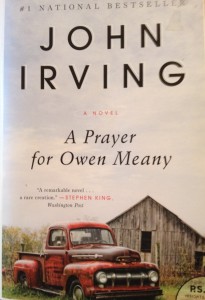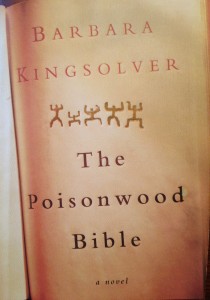CHARACTERS I’LL NEVER FORGET
6/10/2014—CHARACTERS I’LL NEVER FORGET
A Prayer for Owen Meany by John Irving is a long, dense book filled with love, friendship, loss, fear, disappointment—nearly the gamut of human emotions. I love everything about this rich book, but the feature that made the most indelible imprint on my mind was Owen Meany. Every time I glance at the book, wherever it happens to be lying, I see Owen. Whenever I mention the book, or anybody asks me about it, I see Owen. Owen is a unique assembly of physical and mental characteristics who for me will always be the symbol of John Irving’s writing.
So who is Owen?
Owen is an abnormally small boy with an abnormally high-pitched voice who becomes an abnormally small man with an abnormally high-pitched voice. While he abhors his size and sound, Owen believes God has a reason for creating him that way, as Owen believes God has a plan for everything. And in the end, he appears to be right. Owen possesses an uncanny understanding of life as well as his own destiny. He profoundly affects the lives of everyone around him.
who becomes an abnormally small man with an abnormally high-pitched voice. While he abhors his size and sound, Owen believes God has a reason for creating him that way, as Owen believes God has a plan for everything. And in the end, he appears to be right. Owen possesses an uncanny understanding of life as well as his own destiny. He profoundly affects the lives of everyone around him.
In the first sentence of A Prayer for Owen Meany, the narrator, Johnny Wheelwright, says he is doomed to remember Owen. I am, too. Even though this novel is Johnny’s story, in the same way The Great Gatsby is Nick Carraway’s story, I may forget Johnny someday. I’ll never forget Owen Meany.
I may also forget To Kill a Mockingbird’s Jem Finch and maybe Scout Finch, but I doubt I’ll ever forget Boo Radley. For me, Boo Radley is Harper Lee’s most interesting creation. Boo Radley with his hacking cough, sickly white hands and thin, almost feathery hair, a man who’s never seen in the daylight outside his house. Boo Radley with his uncommon devotion and courage. Boo Radley who metes out justice in the end.
 In a similar way, the Price women in Barbara Kingsolver’s The Poisonwood Bible blend together in my memory. They are all well-developed characters in an outstanding novel, yet Adah Price is the only one still sharp in my mind. Born with a neurological disorder, Adah walks with a pronounced limp, and doctors predict she’ll never be able to speak. Adah can speak, but because no one expects her to, she doesn’t, until her life depends on it. While she’s not speaking, she’s thinking and reading. She especially likes to read books backward. And she makes up palindromes, which she calls “snmyhymns” and sings to tunes of familiar hymns. For her, the words to “Amazing Grace” become “Evil, all . . . its sin . . . is still . . . alive!”
In a similar way, the Price women in Barbara Kingsolver’s The Poisonwood Bible blend together in my memory. They are all well-developed characters in an outstanding novel, yet Adah Price is the only one still sharp in my mind. Born with a neurological disorder, Adah walks with a pronounced limp, and doctors predict she’ll never be able to speak. Adah can speak, but because no one expects her to, she doesn’t, until her life depends on it. While she’s not speaking, she’s thinking and reading. She especially likes to read books backward. And she makes up palindromes, which she calls “snmyhymns” and sings to tunes of familiar hymns. For her, the words to “Amazing Grace” become “Evil, all . . . its sin . . . is still . . . alive!”
I think it was the palindromes that first cemented Adah in my mind, but I was also touched by her compassion and belief that all creatures and plants deserve to live. Fortunately, this belief grows stronger in the jungle to which her parents transplant her. In time, she needs it to escape from both the literal jungle and the jungle of her family.
Adah Price, Owen Meany, Boo Radley, and many others like them throughout literature play distinct roles in the stories they inhabit. They don’t look or act like anybody else.
Flannery O’Connor, who’s known for creating unusual characters, says in one of her essays that sometimes a writer has to go to extremes to get her readers’ attention. Sometimes the writer has to make her vision “apparent by shock.” Sometimes she has to shout or “draw large or startling figures.”
If Owen Meany were normal size and sounded like other boys, if Boo Radley walked around on the street every day like everybody else, if Adah Price walked normally and couldn’t make up palindromes, would they linger with me like they do? I don’t know. But I believe the creators of these characters wanted to be sure I gave them my fullest attention because they offer insights into the complexities and meaning of the human condition.
Little Owen Meany is mature beyond his years, a true-blue friend, a challenger of rules, unshakeable in his faith, and possibly a Christ figure. Boo Radley is mysterious, reclusive, tender, loyal to the children, and their savior in the end. Adah Price is mute, brilliant (by far the smartest person in her family), brave, an atheist who finds a kind of personal religion in science and believes that all forms of life are equal.
As readers, we are drawn to them because of their idiosyncrasies, but we stay with them (and they stay with us) because of who they are.
Sally Whitney
Sally Whitney is the author of When Enemies Offend Thee and Surface and Shadow, available now from Pen-L Publishing, Amazon.com, and Barnesandnoble.com. When Enemies Offend Thee follows a sexual-assault victim who vows to get even on her own when her lack of evidence prevents police from charging the man who attacked her. Surface and Shadow is the story of a woman who risks her marriage and her husband’s career to find out what really happened in a wealthy man’s suspicious death.
Sally’s short stories have appeared in magazines and anthologies, including Best Short Stories from The Saturday Evening Post Great American Fiction Contest 2017, Main Street Rag, Kansas City Voices, Uncertain Promise, Voices from the Porch, New Lines from the Old Line State: An Anthology of Maryland Writers and Grow Old Along With Me—The Best Is Yet to Be, among others. The audio version of Grow Old Along With Me was a Grammy Award finalist in the Spoken Word or Nonmusical Album category. Sally’s stories have also been recognized as a finalist in The Ledge Fiction Competition and semi-finalists in the Syndicated Fiction Project and the Salem College National Literary Awards competition.
- Web |
- More Posts(67)